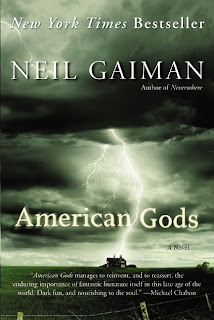I'm a goal oriented person. I can't seem to find motivation to do much of anything unless I have some fantasy end result in mind. It's why I'm lost without a daily to-do list. The only reason I get anything accomplished throughout the day is because I dream of actually finishing the list, just once.
It seems, we all started book blogging for the same general reason -
to share our love of books and find like-minded people to discuss them with. I consider this the first goal of book blogging. Usually within a few weeks of starting a book blog, you find "
the community" and achieve this goal. You find some other blogs, other people find you, comments start flying and viola - you're sharing and discussing.
For those who want to take the next step, this usually means getting your name out there. While marketing and branding seem to have a type of stigma attached to them when talked about in relation to blogging, that's basically what we all do on some level. We are the voice behind our blogs and in some way, we become our blogs. You have no idea how many people actually thing my name is Tequila. I think it's funny. And also a sign that I'm doing things right.
By becoming recognizable in relation to our blogs, we become part of the brand. Whether we're talking on
Twitter,
Facebook,
Goodreads or
LibraryThing, at a convention like BEA or ComicCon networking or handing out business cards, or even just leaving a link in the signature line of an email, we're always marketing ourselves and therefore our blogs. This is a good thing. You want to become a trusted source of book-related information and opinion. The goal here is is that when you talk to someone you've never met before and say "I'm a book blogger from {insert blog name here}", you get a positive response. They've heard of you. They have read you. They're a fan of yours. It's an awesome feeling that validates all of your hard work. It opens doors to more established bloggers, publishers, authors, agents, PR people and others because they already know who you are and what kind of work you do.
What idea of what comes next is where book bloggers usually differ. Most non-bloggers I speak to believe that the end result of book blogging is to monetize and eventually get rich off of it. I call this the "
Julie & Julia Syndrome." That's all non-bloggers know. Some girl had an idea, made a blog, wrote a book, got a movie deal and is now famous and, at least theoretically, rich. As far as I'm concerned, making money from book blogging is a pipe dream. Sure, you'll make a few bucks from affiliating with Amazon, Barnes & Noble, Powells, or the like, but we're talking dollars. Not even tens of dollars in most cases.
I know lots of book bloggers have dreams of using their blogs as stepping stones to careers in writing, publishing, PR or something else related to books. This is an admirable, and quite possibly achievable goal. But, it's not my goal, and I'd imagine not the goal for the majority of bloggers. Which is good for me, because I doubt I could even spin my blog in a way that would get me a job at the local Barnes & Noble.
So really, I'm left wondering, what's the goal once you have an established blog and loyal readers? Once you have publishing contacts? Once you've made $3.21 in the last 6 months from affiliate sales and realize you just don't have the time, creativity or motivation to write a novel that anyone other than your mom would read? I ask because I'm curious what everyone's idea of the next level is.
My "abstract, can't possibly figure out how to make them happen, but still in the realm of possibility I think" goals are:- To meet Stephen King, Laurell K. Hamilton, Bentley Little, Kathy Reichs, J.K. Rowling and any other major (to me) authors that have written books that profoundly changed the way I look at both books and the world.
- To interview above mentioned authors.
- To write a column for a newspaper or magazine. Something along the lines of "And Average Girl's Take on the Book World (with Tequila)."
- To vlog. (This would have been easy if I actually had a webcam. Maybe after my birthday? hint hint)
- To be invited to speak at conferences, giving the readers/bloggers point of view ala
Sarah Wendell. Seriously, how awesome is she?
- To write a monthly Reading with Tequila newsletter. I have ideas, but the logistics of how to actually implement them are lost on me right now.
- And the ultimate dream, to turn Reading with Tequila from a book blog, into a highly regarded website. Like
RT Book Reviews. With forums. And a magazine. And it's own conference.
What are your book blogging goals, both the smaller, easily achievable ones and the huge, seemingly impossible ones?
































